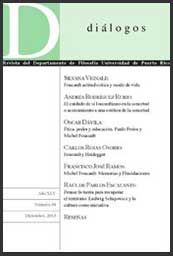Résumé
According to a widely held view, the disappearance of the elenchus in the middle and late dialogues would indicate an important shift in Plato‘s thought. This shift would be so radical that the Socrates found in the Socratic dialogues would not be the same as the Socrates of the Republic. Whereas the first would be a faithful representation of the real –historical– Socrates, the second would be a false, «platonised» Socrates. I challenge this view by shedding light on the continuity between the Socratic dialogues and the Republic concerning the issue of the examination of the soul. Paying attention to this continuity enables us to perceive the unity of Plato‘s project (which is motivated by a concern for politics) and to reject the idea of the two Socrates or worse, of a «schizophrenic Socrates,» as Vlastos once put it. My analysis rests on a political interpretation of Socrates‘ famous watchword: «An unexamined life is not worth living for human beings».Téléchargements
Les données relatives au téléchargement ne sont pas encore disponibles.

